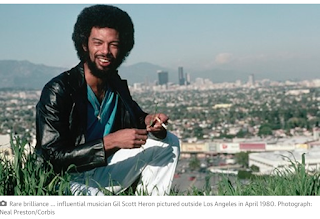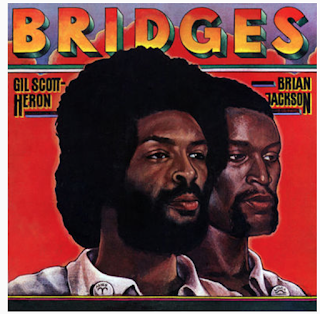Gil Scott-Heron is perhaps the most well known figure on my list of lightly or unknown heroes of African American history. If nothing else, people remember his song "THE REVOLUTION WILL NOT BE TELEVISED."
Often mentioned as the Father of Rap, Gil Scott-Heron is still not well enough known among the young who might be able to truly appreciate him.
I heard an interview with Kareem Abdul-Jabbar the other day and in it he mentions having known Scott-Heron and actually playing drums with him a few times when he came to Los Angeles to play. For several years I made it a point to look for his appearances -- always in the month of February. I remember seeing him at the Wilshire Ebell, Marla Gibb's Marla's Memory Lane Jazz and Supper Club, and McCabes in Santa Monica. I always wondered why he varied his venues -- but then, he was always at least an hour late arriving. Perhaps each venue did not ask him to return?
Gil Scott-Heron's ability to speak to the demons in our minds and souls was unsurpassed. I learned that his own demons would ultimately defeat him, in a final way. He would go to jail his last few years only because of drug possession [OUR HORRIBLE DRUG LAWS - THE UNITED STATES IS INHUMANE AND DRACONIAN], and die at the very young age of 62.
But before this, before the ravages of age and pain and guilt and destruction Gil Scott-Heron would achieve a body of work that left to us an incredible treasure of spoken word and music. Just the titles alone conjure up images that won't easily leave one's consciousness. Each song felt as if he was giving us a political tutorial, an inside view, a lesson in empathy. WHITEY ON THE MOON, HOME IS WHERE THE HATRED IS, [“God, did you ever try to turn your sick soul inside out so that the world could watch you die?”] SAVE THE CHILDREN, WHO'LL PAY REPARATIONS ON MY SOUL, LADY DAY AND JOHN COLTRANE, WINTER IN AMERICA, JOHANNESBURG, WE ALMOST LOST DETROIT, THREE MILES DOWN, SHUT EM DOWN, and ALIEN (HOLD ON TO YOUR DREAMS).
From the L.A. Times: "Gil Scott-Heron was born in Chicago on April 1, 1949. His mother, a librarian, and father, a professional soccer player from Jamaica, split up when he was 2, and he went to live with his grandmother in Jackson, Tenn.
"There he had firsthand experience with racial issues: He was among a group of black children who integrated a local elementary school. He also began playing piano and encountered one of his major influences."
"I was a big fan of Langston Hughes, who wrote a weekly column in a black newspaper," he said in a 1999 interview with the San Francisco Chronicle. "My grandmother used to get it every Thursday, and we used to sit out on the front porch and read it."
"The Harlem poet and author triggered Scott-Heron's literary side, and after he moved to New York to live with his mother, his talent led him to the prestigious Fieldston School. He went on to Hughes' alma mater in Pennsylvania, Lincoln University, and in 1970 published a novel, "The Vulture," followed by a volume of poetry, "Small Talk at 125th and Lenox."
From the NY Times: "Mr. Scott-Heron often bristled at the suggestion that his work had prefigured rap. “I don’t know if I can take the blame for it,” he said in an interview last year with the music Web site The Daily Swarm. He preferred to call himself a “bluesologist,” drawing on the traditions of blues, jazz and Harlem renaissance poetics."
"Yet, along with the work of the Last Poets, a group of black nationalist performance poets who emerged alongside him in the late 1960s and early ’70s, Mr. Scott-Heron established much of the attitude and the stylistic vocabulary that would characterize the socially conscious work of early rap groups like Public Enemy and Boogie Down Productions. And he has remained part of the DNA of hip-hop by being sampled by stars like Kanye West."
“You can go into Ginsberg and the Beat poets and Dylan, but Gil Scott-Heron is the manifestation of the modern word,” Chuck D, the leader of Public Enemy, told The New Yorker in 2010. “He and the Last Poets set the stage for everyone else.”
The last epitaph for G. Scott-Heron - http://www.theguardian.com/books/2013/oct/25/the-last-holiday-gil-scott-heron-review
Who Is Gil Scott-Heron? a movie - http://gilscottheron.net
Biography, streaming albums - http://www.allmusic.com/artist/gil-scott-heron-mn0000658346
Discography at Discogs -- http://www.discogs.com/artist/16533-Gil-Scott-Heron
Obituary in New York Times - http://www.nytimes.com/2011/05/29/arts/music/gil-scott-heron-voice-of-black-culture-dies-at-62.html?login=email&_r=0
Rolling Stone obituary - http://www.rollingstone.com/music/news/gil-scott-heron-forefather-of-hip-hop-dead-at-62-20110528
Los Angeles Times obituary - http://articles.latimes.com/2011/may/29/local/la-me-gil-scott-heron-20110529
Dave Zirin Interview with Kareem Abdul-Jabbar - http://www.thenation.com/article/kareem-abdul-jabbars-beautiful-mind/





No comments:
Post a Comment